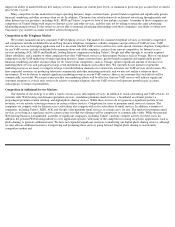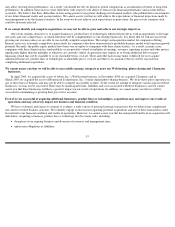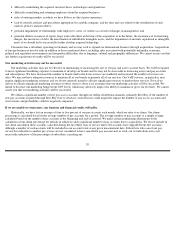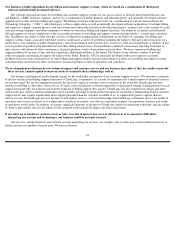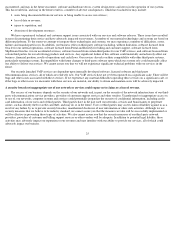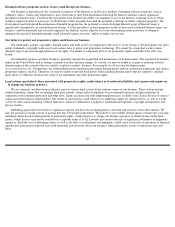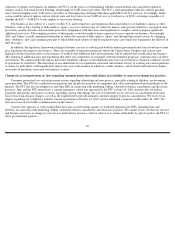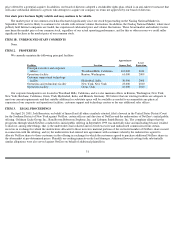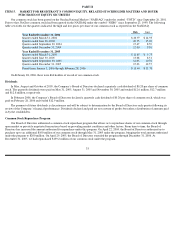Classmates.com 2005 Annual Report Download - page 24
Download and view the complete annual report
Please find page 24 of the 2005 Classmates.com annual report below. You can navigate through the pages in the report by either clicking on the pages listed below, or by using the keyword search tool below to find specific information within the annual report.
ceased operations or ceased offering the services we require, causing us to switch vendors. Vendors may experience significant financial
difficulties and be unable to perform satisfactorily or to continue to offer their services. MCI, Level 3 Communications, Pac-West and Qwest
have significant amounts of debt obligations. The loss of vendors has resulted, and may in the future result, in increased costs, decreased service
quality and the loss of users. In particular, the failure of Level 3 Communications, MCI, Pac-West or Qwest to continue to provide the scope,
quality and pricing of services currently provided could materially and adversely affect our business and results of operations. Some of our
telecommunications services are provided pursuant to short-term agreements that the providers can terminate or elect not to renew. In addition,
each of our telecommunications carriers provides network access to some of our competitors and could choose to grant those competitors
preferential network access or pricing. Certain of our telecommunications providers compete with us in the market to provide consumer Internet
access. As a result, any or all of our current telecommunications service providers could discontinue providing us with service at rates acceptable
to us, or at all, which could materially and adversely affect our business, financial position, results of operations and cash flows.
Market rates for telecommunications services used in our business have declined significantly in recent years. We do not anticipate that
such rates will continue to decline at the same rate in the future, if at all. General market forces, the failure of providers, regulatory issues and
other factors could result in increased rates. Any increase in market rates would increase the cost of providing our services and, if significant,
could have a material adverse effect on our business, financial position, results of operations and cash flows.
If we fail to manage our telecommunications or our internal network capacities, our access service levels may suffer or we may
experience increased per-account costs.
We will have to accurately anticipate our future telecommunications capacity needs within lead-time requirements. If we fail to procure
sufficient quantities of telecommunications services, we may be unable to provide our users with acceptable service levels. Conversely, if we
purchase excessive amounts of telecommunications services we will have increased costs, which could decrease our profitability. We have
experienced such overcapacity in the past, and we may experience overcapacity in the future. Our failure to effectively manage
telecommunications costs could adversely affect our reputation as a quality provider of Internet services or could adversely affect our
profitability.
In addition, we may from time to time experience increases in our telecommunications usage that exceed our then-available
telecommunications capacity and the capacity of our internal servers. As a result, users may be unable to register or log on to our services, may
experience a general slow-down in their Internet access or may be disconnected from their sessions. Excessive user demand could also result in
system failures of our internal server networks, which would prevent us from generating advertising revenues. Inaccessibility, interruptions or
other limitations on the ability to access our services due to excessive user demand, or any failure of our servers to handle user traffic, could
adversely effect our reputation, lead to subscriber cancellations and could adversely affect our revenues.
Our business will suffer if the scope or quality of service from our telecommunications carriers is inadequate.
If our telecommunications service providers deliver unacceptable service, the quality of our Internet access service would suffer. In this
event, we would likely lose users who are dissatisfied with our service. Since we do not have direct control over our telecommunications
carriers’ network reliability and the quality of their service, we cannot assure you that we will be able to provide consistently reliable Internet
access for our users.
23




